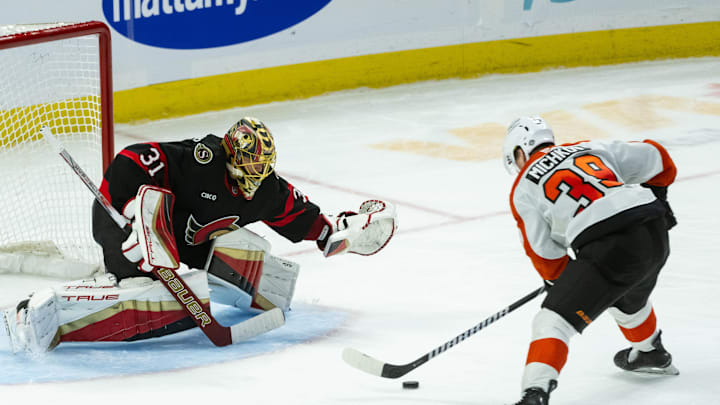The expectations for Matvei Michkov’s 2024‑25 season were non‑existent. He was not supposed to cross the Atlantic until 2026, so his arrival was a huge, welcome surprise for the organization and the fan base.
With the Russian phenom’s first campaign in the books, we can see how he stacks up. He finished top‑10 among Flyers rookies in goals, assists, and points, and top‑three among all 2024‑25 NHL rookies.
Perspective for Michkov's Rookie Season
Michkov | Flyers Rookies | NHL Rookies | 2024-25 Rookies | Rookies since 2015 | |
|---|---|---|---|---|---|
Goals | 26 | 7th | 123rd | 1st | 13th |
Assists | 37 | 8th | 113th | 3rd | 23rd |
Points | 63 | 8th | 95th | 2nd | 12th |
Only Lane Hutson (66 pts) out‑produced Michkov, and Hutson logged roughly six minutes more per game. Michkov saw middle‑six average ice time, not that of a blossoming star. Per QuantHockey, Michkov (2.83) outpaced Hutson (2.12) in points per 60 minutes by roughly 33 percent.
Given the same amount of ice time, Michkov would have finished the season as an over‑a‑point‑per‑game (1.07) player with 88 points in 82 games. This would put Michkov in another stratosphere, eclipsing Mikael Renberg’s rookie record (82 points) in orange and black by six.
Michkov's numbers look great in many of these areas, and seeing them is a sight for sore eyes. The last Philly rookie to crack the 40‑point mark was Shayne Gostisbehere nine seasons ago. An argument could be made that Michkov's numbers could have been even better under a different coach who would have given him a longer leash.
Former Flyers bench boss John Tortorella sent him to the press box for two games and benched him for stretches during others after a mistake he deemed worth punishing. Players were often shuffled between lines, valuing short bursts of success over building for the future.
The Flyers did not have a high‑caliber center to pair with Michkov, which likely would have improved performance. Without an anchor for Michkov and consistent chemistry, turning individual talent into a dominant line is daunting. This is part of building culture and needs to be a high priority for the Flyers.
Talent begets talent
Complementary, skilled line combinations can be difference‑makers for an entire organization. Ville Leino, Danny Briere, and Scott Hartnell were having lackluster seasons when they formed the “Redemption Line” fifteen years ago. That postseason, they combined for 68 points in 21 games, powering the 2009‑10 Flyers to the Stanley Cup Final and a 0‑3 comeback against Boston in the Eastern Conference semis.
Other famous Philly trios tell the same story. The L‑C‑B Line (Leach‑Clarke‑Barber) took the Flyers to four Finals and seven straight playoffs, capturing both franchise Cups. The Legion of Doom triggered three post‑season runs, including the 1997 Final, while the Hi‑Speed Line (Propp‑Flockhart‑Allison) helped Philadelphia reach four straight post‑seasons in the early ’80s. Even the Crazy Eights Line (Lindros‑Recchi‑Fedyk) piled up regular‑season numbers, if not playoff glory.
Filip Forsberg as a comp
Michkov matched Filip Forsberg’s rookie line at 26‑37‑63. Forsberg is stronger defensively, but both players boast high hockey IQ, elite skill, and plenty of creativity.
Forsberg, who turns 31 in August, has flirted with 50 goals, 50 assists, and 100 points, earning multiple All‑Star nods and a spot on the 2015 NHL All‑Rookie team. He may not be Hall‑of‑Fame bound, but his career has been terrific.
Eighty games are too small a sample to chart an entire career, but the trajectory is undeniably promising, even with the Calder Memorial Trophy snub. Philadelphia hasn’t drafted and developed elite talent in a long time; Michkov is a cornerstone, but the organization must build around him, and there are still many holes to fill.
